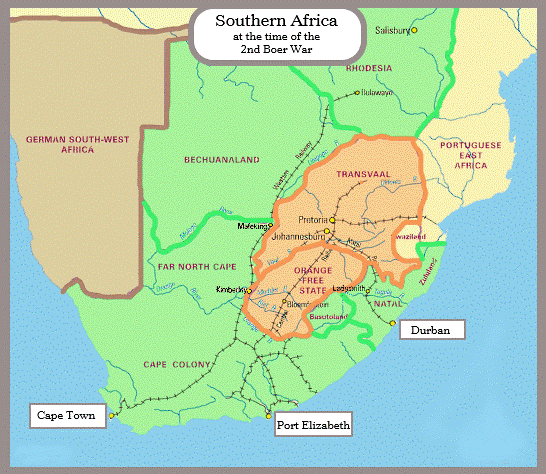
Exploring the lives and service of men with connections to this Shropshire market town and its hinterland
The Boer War, or more correctly the Second Boer War (October 1899 to May 1902) is often lost behind the shadow of the First World War. Most people can visualise Great War soldiers marching to war, that is portrayed on grainy early film. Because the First World War started fifteen years after the Boer War, filming had developed to the extent that it could be presented to the mass market of 1914. The Boer war has much less archival film or photographs, and so remains more hidden.
The Boer War was Britain’s last full scale colonial war against the two independent states of the South African Republic (called the Transvaal by the British) and the Orange Free State. As with so many wars, the Boer War started because of the substantial findings of gold and diamonds and ultimately who had control over them.

In Whitchurch, the war must have seemed distant when the conflict started, and something to be dealt with by the regular army. Unfortunately, the British were ill-prepared and overconfident. To the War Department in London it seemed unlikely that the Boers could put up much of a fight, they were after all only farmers. But the Boers were well armed, and importantly had a cause – they believed they were fighting for their own land and the riches underneath it. The Boers struck hard and fast, capturing the population centres of Kimberley, Mafeking and Ladysmith. They became adept at using the ground to their advantage, seeking battle only when it suited them, or were cornered. The modern term for these tactics is guerrilla warfare. To flush out their prey the British used a scorched earth policy, burning the Boers’ farms and crops.
The British government, embarrassed at its lack of control, poured further men and resources into the Boer heartlands – most of the Whitchurch men who served joined the war at this stage. Britain ended up sending over 347,000 men to South Africa, to fight a Boer strength estimated at around 45,000 and it still took the British two years and seven months to bring the conflict to an end. The Anglo Boer War Society estimates that over 22,000 British soldiers were killed (many by disease) while the Boers lost over 6,000. A darker side to British Imperial history is that many of the Boers who died did so after their capture, being held in the world’s first concentration camps.
Neither the scorched earth policy or concentration camps reflected much glory to the British Imperial cause, a cause for which many Whitchurch men joined to further.